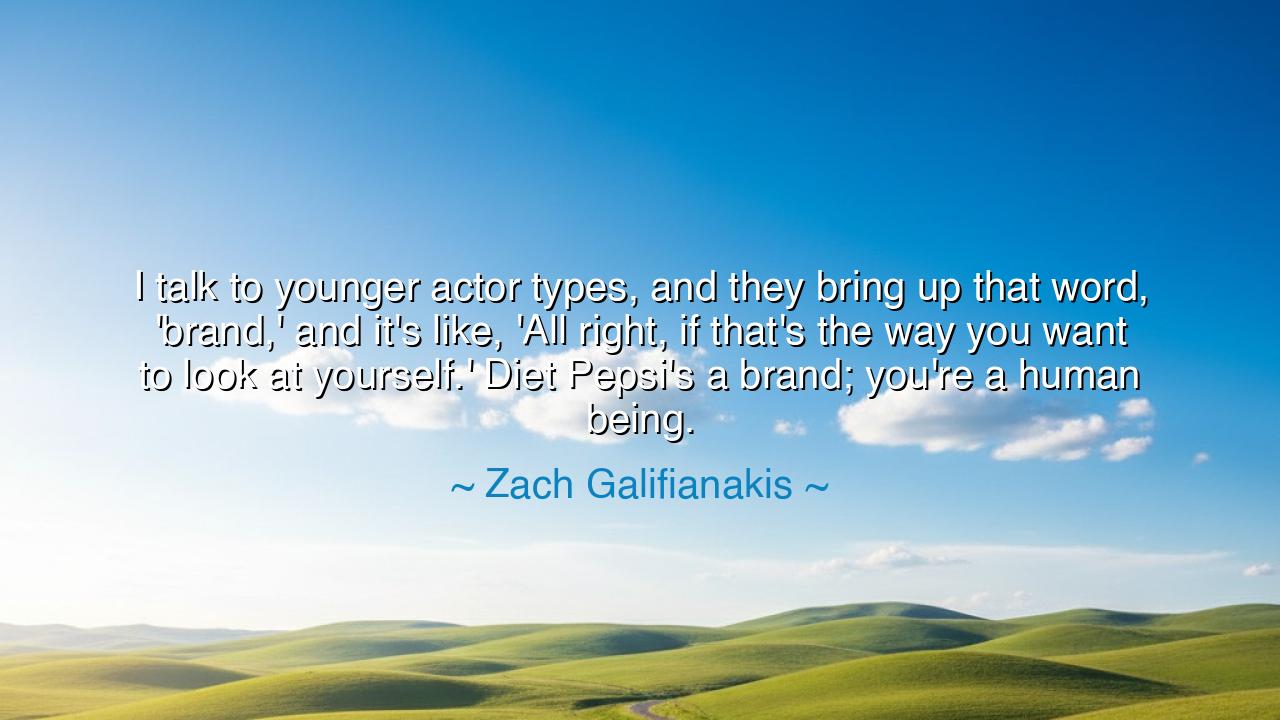
I talk to younger actor types, and they bring up that word
I talk to younger actor types, and they bring up that word, 'brand,' and it's like, 'All right, if that's the way you want to look at yourself.' Diet Pepsi's a brand; you're a human being.






In the words of Zach Galifianakis, the jester who sees the world more clearly than most kings, we find a rebuke as sharp as it is wise: “I talk to younger actor types, and they bring up that word, ‘brand,’ and it’s like, ‘All right, if that’s the way you want to look at yourself.’ Diet Pepsi’s a brand; you’re a human being.” Though spoken in jest, this truth burns like fire beneath laughter. For what he condemns is not ambition, but self-reduction—the slow forgetting of what it means to be human in an age that worships image over essence. His words are a mirror held up to a world that would rather be consumed than known, admired than understood.
In this quote, Galifianakis does not mock the young—he mourns for them. He sees a generation mistaking the glow of screens for the light of the soul. The “brand”, he reminds us, is a creation of commerce—a thing designed, polished, and sold. It has no pulse, no depth, no contradiction. But a human being is alive with shadow and light, with love and fear, with failure and grace. To live as a brand is to flatten one’s spirit into a slogan. To live as a person is to accept the sacred mess of being real. The wisdom of his words lies in this distinction: that life cannot be packaged without losing its breath.
The origin of such a thought rises from our modern fever—a world that measures worth not in virtue, but in visibility. In his years within the glare of Hollywood, Galifianakis saw how actors, musicians, and creators were taught to trade authenticity for marketability. Where once an artist sought to move hearts, now many seek to build “followers.” The word “brand” has replaced “identity.” The soul has become a commodity. His rejection of this is not merely humorous—it is heroic, for in an age of performance, to remain sincere is the rarest act of rebellion.
The ancients, too, spoke of this danger. The philosopher Diogenes, who lived in poverty and mocked the pride of Athens, would carry a lantern through the city at noon, saying, “I am looking for an honest man.” He, like Galifianakis, sought to awaken his people from illusion. When Alexander the Great asked what gift he desired, Diogenes replied only, “Stand out of my sunlight.” Such is the same spirit that moves through Zach’s words: the defiance of false glory, the refusal to let one’s light be shadowed by the artificial glow of public approval.
History is filled with souls who chose truth over image. Consider Vincent van Gogh, who died unknown, painting not to build a brand but to express the ache of the eternal. Or the philosopher Socrates, who refused to bend his beliefs to please the crowd, drinking the hemlock with serenity rather than betray his own conscience. These men lived not as symbols, but as seekers—unconcerned with fame, yet immortal because of their sincerity. Galifianakis stands in that same lineage of the unbranded—the human over the manufactured.
What he teaches, through humor, is a kind of spiritual awakening. To chase the “brand” is to chase control, but to live as a human being is to embrace mystery. A brand cannot feel doubt, but a man can grow through it. A brand cannot love imperfectly, but a man can be redeemed through it. In reducing ourselves to products, we lose the very contradictions that make us holy. We forget that our flaws, our confusion, our unmarketable sincerity—these are the proofs that we are alive.
The lesson is simple, but vital: do not mistake your reflection for your being. Refuse the tyranny of constant presentation. Remember that your value is not in how others perceive you, but in how truthfully you live. Build not a brand, but a life. Cultivate your craft, your mind, your compassion. Let your reputation follow as a shadow follows light—naturally, not by force. As Galifianakis suggests, you are not Diet Pepsi—you are not made to be consumed, but to be known, to love, to err, to create.
And so, his words endure as a warning for this new age of mirrors: do not let the world sell you back to yourself. Let your humanity remain untamed, unpolished, and real. For one day, when all brands fade and all images blur, what will remain is not how many people recognized your face—but how many souls were changed by your truth. Be human, not marketable. Be alive, not admired. For it is better to be real and forgotten than branded and hollow.






AAdministratorAdministrator
Welcome, honored guests. Please leave a comment, we will respond soon